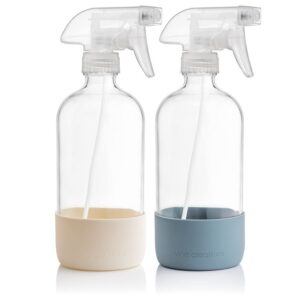If you want to achieve sustainability in our life, change must start at home first. With a few small, purposeful changes in our daily activities, we can protect our planet, and simultaneously save money. These Eco-Friendly substitutes at home are helpful whether you are just starting eco-friendly living or finding ways to achieve big impacts in life. The encouraging part to become eco-friendly is that you do not have to change at once, rather need to focus on those areas where a small change can generate a bigger impacts. With continuous effort, smaller substitute can enhance quality and health of our life but also attract people to adept to eco-friendly lifestyles.
Here are some less tiring and effective Eco-Friendly Substitutes at Home one can start:
One of the most important Eco-Friendly Substitutes at Home is,
Your Kitchen:

Despite the kitchen being a major source of food related waste, it also provides ample opportunity to make eco-friendly changes.
Replace Single Use Food Wraps With:
Beeswax Wraps or Silicone Lids: Beeswax wraps can cover bowls or wrap food and serve as a reusable, breathable and compostable substitute for cling film and aluminum foil. Moreover, silicone lids are another good alternative being rugged and longer life.

Eco-friendly Storage Containers: Stainless and Glass does not discharge any toxic and can be used multiple times as compared to plastic or other materials.
Reusable Bags, Also Called Embrace:
Change Bags: Plastic bags contaminate food and consumable items and are one of main reasons of drainage choking. Replace it with mesh or clothing bags for shopping grocery or eatable items.

Place bags near: Mostly we forget taking these reusable bags for shopping grocery, place required quantity in your car or at door which will surely remind you and it will become your habit.
In Cleaning: Eco-Friendly Substitutes at Home
Refillable Cleaners: Some good brands offer refill offer or concentrated formulas for their cleaners. You do not have to buy new bottles every time. One can also make homemade cleaners using soda, vinegar or other oils which are easily available in kitchen.

Reusable Cleaning Cloths: Minimize paper towel use by replacing with new microfiber towels or even old shirts or cloths which are not required for your wardrobe.

Composting: Some food items like vegetable and fruit peels are good fertilizers and can be used for kitchen garden as they can choke sewerage and clog. Tea bags and coffee grounds can also contribute same way. Composting services can also be helpful to dispose off such things.

Coffee and Tea filters: If we use less tea bags filter and rely on natural stainless steel, it can help to achieve sustainability.
Bathroom: Your Eco-Friendly Oasis
A lot of effort can be incorporated in our bathrooms; reduce plastic waste and replace it with eco-friendly materials.
Shampoo and Conditioner substitutes:
Solid Bars: Shampoo and conditioner bars tend to outlast their bottled counterparts more often, and are accompanied by the elimination of plastic containers.

Soap Bars: Choose bar soap rather than liquid hand soap provided in a plastic dispenser, thereby switching to bar soap.

Oral Care That Decomposes:
Bamboo Toothbrushes: A small yet powerful change, no one wants to think about the fact that the brushes we use to scrub our teeth are made of plastic and take centuries to degrade and using a bamboo toothbrush makes this problem a non-issue.

Toothpaste without plastic packing: Some options like tablets, glass jars, or aluminum tubes have no plastic packaging.

Cotton Rounds/Makeup Remover Pads: Substitute throw away cotton balls and pads with more durable washable ones.

Tampons and pads are more wasteful, the menstrual cups are a more ecological option.
Safety razors: allow you to use metal blades instead of plastic which reduces waste.
Around the House: Conscious Eco-Activity
Switching to a more Eco choice will have impact beyond the kitchen and bathroom.
Shopping Bags: Always having a set of reusable shopping bags in your car or next to your door encourages eco-friendly shopping.
Fashion: Buying from eco-friendly brands that use organic materials such as cotton, linen,hemp,Tencel ,and actively support sustainable apparel helps the environment. Wearing secondhand clothes also bamboo.

Reduce Energy Consumption: Electronics should be turned off if not in use. LED’s consume less energy than conventional bulbs. Keep windows opened and use natural source of light which is healthy for life. Before construction of your house, take care of eco-friendly efforts.
Healthy transportation: Use bicycle, rely on walking for short distances and if necessary use public transport. This will not only contribute to healthy environment but also change your own health.

Support Ethical and Local Businesses: Keep supporting businesses that matter to you which engage in fair trade, protect the environment, and source locally.
Making Eco-Friendly Substitutes at Home is a continuous journey, not a destination. Start with the changes that are easiest for you, then progressively make them into habits. Once those initial changes turn into habits, more can be added.
To make a home more eco-friendly does not require a complete overhaul. One or two changes can be made and with time more will be added. Every little change helps reduce waste and go towards protecting the planet. With each effort made, a more sustainable home is created, resulting in a greener future for all to enjoy. Make responsible living a reality by transforming your home into a haven of environmental consciousness.





